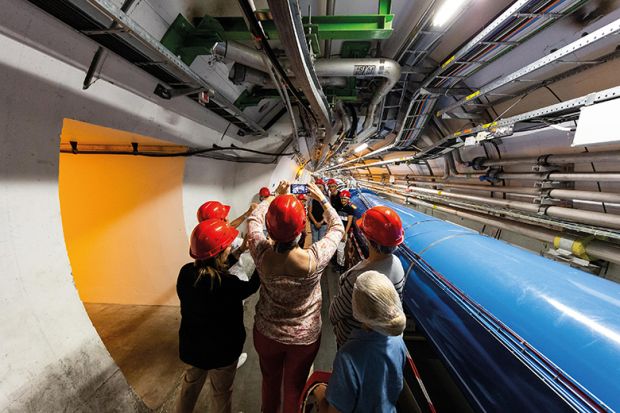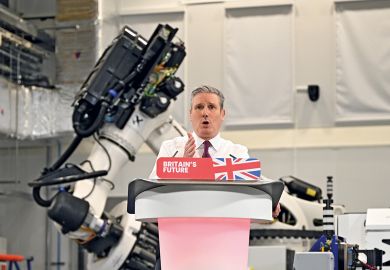Labour’s decision to axe a £800 million supercomputer planned for the University of Edinburgh does not augur well for bigger decisions on UK science funding due in October’s spending review.
With a recently identified £22 billion “black hole” in public finances likely to mean cuts across Whitehall, few expect chancellor Rachel Reeves to lavish extra cash on the Department for Science and Technology, particularly given the notable absence of any pre-election spending commitments around science budgets.
Yet one glimmer of hope might lie in Labour’s only significant electoral policy around science – the promise of 10-year-budgets for UK Research and Innovation (UKRI) and other major research funders.
That offer has been billed by science secretary Peter Kyle as transformative. In a speech at the Labour Party conference in October, Mr Kyle told delegates in Liverpool how decade-long research budgets would “create certainty” for science and industry alike by removing these outlays from Ms Reeves’ biannual spending reviews.
“This would allow relationships with industry to be built, long-term partnerships to form and lead to investment in new technology and the infrastructure that underpins it,” he said.
His then deputy Chi Onwurah – who held the shadow science brief up until July’s election but was overlooked for a ministerial post in favour of Sir Patrick Vallance – went further. Long-term stability from these budgets would enable universities and other bodies to offer longer contracts to researchers, she told a conference in March, which could also reduce the stress faced by postdocs forced to hop between contracts linked to three- or four-year grants.
But will 10-year research budgets really help the sector as promised? John Womersley, who previously headed the Science and Technology Facilities Research Council, was not convinced. “I’m quite cynical about this,” he told Times Higher Education.
“Fundamentally, I’m not certain that this can really be done – can this Labour government really write rules that bind any successor administration? Any budgets for future years could easily be ripped up if a new government is elected.”
Scientists and funders may also wonder if they will benefit from a decade-long settlement decided in the midst of a profound crisis for public spending.
“It’s why you don’t really see employees accepting 10-year pay deals – they usually think they will get a better pay deal further down the line. What I’d prefer to see is a clear statement saying science spending will increase above inflation every year throughout this Parliament,” Professor Womersley continued.
At present, public spending on research and development stands at about £20 billion annually, with UKRI’s budget, decided back in 2021, set to hit £8.9 billion in 2024-25, up from £7.8 billion in 2021-22.
Professor Womersley predicted that the 10-year offer really represented an attempt to soften the blow of a lower settlement for UKRI. “The Treasury will say, ‘This budget is lower than it is now but it is guaranteed not to reduce any further,’” he said, adding: “There is a sense of impending crisis in the university sector, so the government might also be hoping these longer deals mean UKRI can advance more money to research to help universities, though I’m not sure this will help much.”
However, smaller research budgets guaranteed over a longer period might not be a disaster for UK research, said Douglas Kell, who previously led the Biotechnology and Biological Sciences Research Council. “If I were still the chief executive of a research council, I’d definitely take this deal – 10 years is much better [than the current three-year budgets], as you can plan,” he said, adding that he would be “less worried about mediocre deals as governments can always add extra but cannot take away as the Tories did, dropping settlements in real terms every time”.
On this front, Professor Kell, now research chair in systems biology at the University of Liverpool, noted how Tony Blair’s government found an extra £100 million in 1999-2000 when “genomics came along, even though it was in the wrong part of the then five-year [funding] cycle” – an investment that he believes was crucial for the UK’s now-thriving life sciences sector.
On whether the 10-year budgets might lessen researcher precarity, as Ms Onwurah suggested, Professor Kell was less certain. “It won’t mean 10-year grants to individuals, which mostly make no sense in any case,” he said – a position directly opposed to the enthusiasm of former Conservative science minister George Freeman, who championed longer fellowships spanning up to seven years.
For his part, Professor Womersley doubted decade-long budgets were likely to catalyse such a change either.
“The argument is that you could hand out longer future leaders fellowships or guarantee funding for research centres as you do for Cambridge’s Laboratory of Molecular Biology. That would be a lovely thing to do but is it the highest priority of the sector?” he asked.
“Would UKRI really want to start funding labs or individuals for a decade at a time? It would have to give up control of what happens with its money, which would require a huge reset of how science is managed and monitored in this country.”
Register to continue
Why register?
- Registration is free and only takes a moment
- Once registered, you can read 3 articles a month
- Sign up for our newsletter
Subscribe
Or subscribe for unlimited access to:
- Unlimited access to news, views, insights & reviews
- Digital editions
- Digital access to THE’s university and college rankings analysis
Already registered or a current subscriber?








